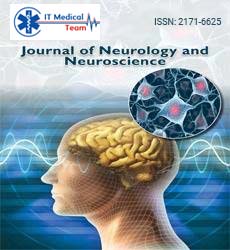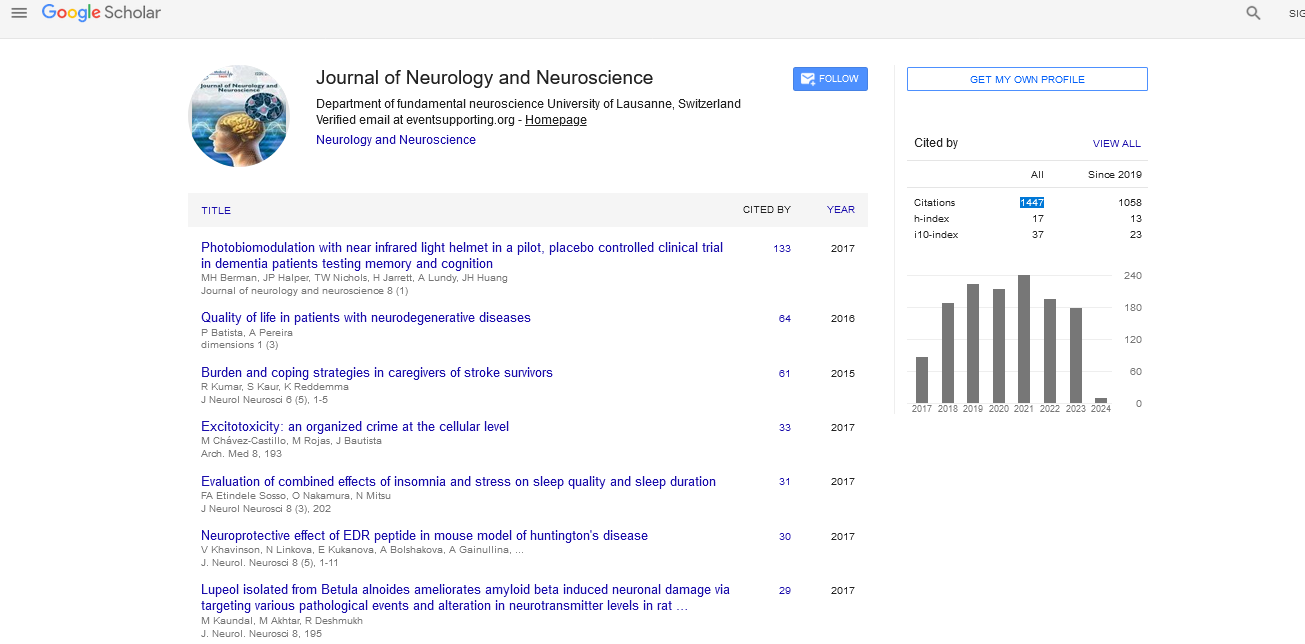Perspective - (2023) Volume 14, Issue 4
Neuroinflammation and cognitive decline: Mechanisms and therapeutic approaches
Julia Aguiar*
Department of Neurosciences, University of Turin, 10126 Turin, Italy
*Correspondence:
Julia Aguiar, Department of Neurosciences, University of Turin, 10126 Turin,
Italy,
Email:
Received: 01-Aug-2023, Manuscript No. ipjnn-23-14068;
Editor assigned: 03-Aug-2023, Pre QC No. P-14068;
Reviewed: 17-Aug-2023, QC No. Q-14068;
Revised: 23-Aug-2023, Manuscript No. R-14068;
Published:
31-Aug-2023
Introduction
Cognitive decline, a hallmark of aging and
neurodegenerative disorders, presents a significant global
health challenge. Recent research has revealed a strong
connection between neuroinflammation and cognitive
impairment. Neuroinflammation refers to the activation
of the immune system within the central nervous system,
leading to the release of pro-inflammatory cytokines,
oxidative stress, and microglial activation. This paper
delves into the intricate mechanisms through which
neuroinflammation contributes to cognitive decline and
explores promising therapeutic approaches aimed at
attenuating these processes [1].
Description
This comprehensive review begins by elucidating
the molecular and cellular mechanisms that underlie
neuroinflammation-associated cognitive decline. It
discusses the role of microglia, astrocytes, and the bloodbrain
barrier in modulating the inflammatory response
within the brain. The paper also explores the impact of
chronic neuroinflammation on neurodegenerative diseases
such as Alzheimer's and Parkinson's disease, shedding
light on the shared pathways involved. Furthermore, the
paper delves into various therapeutic approaches designed
to target neuroinflammation and its detrimental effects
on cognitive function. These approaches encompass
pharmacological interventions, lifestyle modifications, and
emerging techniques like immunomodulation and the gutbrain
axis. Current clinical trials and their outcomes are
discussed to provide insights into the potential effectiveness
of these treatments [2].
This paper also delves into the intriguing interplay
between neuroinflammation and other critical factors
influencing cognitive decline, such as oxidative stress,
mitochondrial dysfunction, and synaptic dysfunction.
Understanding how these mechanisms intertwine with
neuroinflammation provides a more comprehensive
picture of the multifaceted nature of cognitive decline.
Moreover, the discussion extends to the influence of
genetic predispositions and epigenetic modifications
on an individual's susceptibility to neuroinflammationinduced
cognitive decline [3]. This genetic component
highlights the importance of personalized medicine
approaches in tailoring therapeutic strategies to an
individual's unique profile. In addition to traditional
pharmaceutical interventions, this review explores emerging non-pharmacological approaches, including
lifestyle modifications such as exercise, diet, and cognitive
training. These interventions not only aim to reduce
neuroinflammation but also promote neuroprotection
and cognitive resilience, providing a holistic approach
to combating cognitive decline. Furthermore, the paper
investigates the evolving field of neuroinflammationtargeted
therapies, such as monoclonal antibodies, small
molecule inhibitors, and gene therapies [4].
The potential of immunomodulation and stem cellbased
therapies in mitigating neuroinflammation is also
discussed, highlighting the cutting-edge developments in
the field. Finally, the description emphasizes the importance
of interdisciplinary collaboration among neuroscientists,
immunologists, clinicians, and pharmaceutical researchers
to drive progress in understanding neuroinflammation's
role in cognitive decline and to develop innovative
therapeutic approaches. By bringing together diverse expertise, we can accelerate the translation of promising
discoveries into effective treatments, offering hope to
individuals facing cognitive decline and their families [5].
Conclusion
In conclusion, neuroinflammation emerges as a
central player in the pathogenesis of cognitive decline
and neurodegenerative diseases. The intricate mechanisms
through which neuroinflammation disrupts cognitive
function underscore the need for innovative therapeutic
approaches. While significant progress has been made
in understanding these mechanisms and developing
potential interventions, further research and clinical trials
are warranted to validate the efficacy and safety of these
strategies. Ultimately, addressing neuroinflammation as a
therapeutic target holds promise in alleviating cognitive
decline and improving the quality of life for individuals
affected by neurodegenerative diseases.
References
- Ferrier L, Bérard F, Debrauwer L, et al. Impairment of the intestinal barrier by ethanol involves enteric microflora and mast cell activation in rodents. Am J Pathol 2006;168(4):1148-1154.
Google Scholar, Crossref, Indexed at
- Crews FT, Vetreno RP. Mechanisms of neuroimmune gene induction in alcoholism. Psychopharmacol. 2016;233:1543-1557.
Google Scholar, Crossref, Indexed at
- Qin L, Wu X, Block ML, et al. Systemic LPS causes chronic neuroinflammation and progressive neurodegeneration. Glia. 2007;55(5):453-62.
Google Scholar, Crossref, Indexed at
- Schoonjans K, Staels B, Auwerx J. Role of the peroxisome proliferator-activated receptor (PPAR) in mediating the effects of fibrates and fatty acids on gene expression. J Lipid Res 1996;37(5):907-925.
Google Scholar, Crossref, Indexed at
- Haile CN, Kosten TA. The peroxisome proliferator-activated receptor alpha agonist fenofibrate attenuates alcohol self-administration in rats. Neuropharmacol. 2017;116:364-70.
Google Scholar, Crossref, Indexed at





